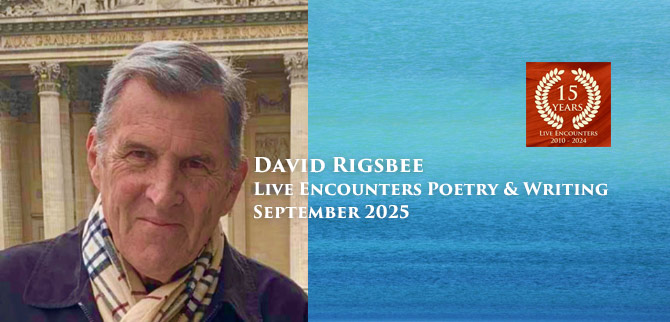
Live Encounters Poetry & Writing September 2025
Out of Frame, poems by David Rigsbee.
Out of Frame
Flat light. The houses rise gleaming
out of the grass. Here an aluminum ladder
and some weathered fence slats seem
out of business in the green and the moss.
That one-propeller plane keeps the air busy.
Some birds have a conclave in a neighbor yard.
It was something urgent, whatever else it was.
Just the thing when light outdoes the attention
as both soften, the corners bend and darken
like an old photo in the middle of which
stands a farmer, awkward, sure of nothing
except the work the dusted fields require
out of frame, behind the gathered family
that, except for his inscrutable frown
he cannot explain or describe to the viewer.
Once a Skunk
The dog looks up from the end
of the master’s leash. He’s trying
to tell you he’s the familiar of clouds,
especially those mid-summer armadas,
the colliding forces of cumulus and stratus.
The master, meanwhile latex-gloved,
waits. It’s the inverse of leash law,
the orderliness brought to fecal matter,
clean sidewalks pacing away unbroken
until the road turns, either curving
or dipping at the horizon out of sight.
When I was a child, I walked the dirt
path outline dividing field from forest.
Often an animal would bound or slink
or creep from one to the other. Once a skunk
ambled out of the woods and plunged
into the corn, the same day a cornsnake
made its hasty sine wave in the dirt
like the fingering on a cello during
a difficult passage in the repertoire,
angling from field to piney thicket;
finally like a buzzer going off in a dream.
It was the way home then, and unless
time is a lie, it is the way home now.
Holding Lear
To his children, the father sent a note:
“Henceforth, all requests for gifts and loans
should be made through my attorney.”
A coin dropped under the table first rolls,
then wobbles in an onrush of uncertainty
until it lies down spinning, speeding up
even as it settles, before coming to rest
altogether, an inert thing among things.
When it was a wheel, it dreamed
the Royal Brougham was dead weight
without it, the government in ruins.
Perhaps we should, as Vaughan
recommended, expect and moan.
Downstairs my daughter regards the sea
by staring into her phone. When it was clear
he was dying, my father, who hugged a pillow
months to his aching lung, cut loose
and cried in the night like a girl.
Standing in Barnes & Noble, I reread
the opening lines of King Lear, “I thought
the king had more affected …” and put
it down, the Arden edition with its
massive apparatus, the text afloat
on an ocean of explanatory notes,
and on the cover, bare tree crooking
charcoal joints, leaves long in the process
of blowing out over bare earth, a fact
not even bad art can fail to get right.
Advent
Now, the first of December was covered with snow,
sang James Taylor. And it was. Ohio was under
an advisory, Virginia just getting underway. It was
one of those dread afternoon assignments. I was
teaching Hart Crane to an auditorium of students
still in their overcoats, trying to jot down Crane’s
heartache in bullet points. I know they will remember
how complicated it was, but should they ever
refer to their notes, they will find it there, now
thirty years on, how the sky looked this way and that
divided by the cedar crown. They slushed their way
back to the parking lot, their dorms and lives.
Today, I refer to my notes, as I do every year:
your hair parted in the middle, your mustache
bent in a frown like an activist, ca. 1975.
Weeks earlier, you had called to invite me
to Thanksgiving. My partner, not yet
under the pacific cloud of Zoloft, and citing
upcoming law school exams, made the case:
we wouldn’t go. She recalled your only visit, when,
with new bride in tow, you stowed a wine bottle
under the guest room bed. We could only hear
the rustle and thump, proof of mischief.
You had become a nonperson in her eyes.
She was unkind, and you saw how it verged
on misery before succumbing to worse.
You knew because I told you, riding around
the Virginia mountains before you left,
waving from the window that summer day.
Your call was the last time I heard your voice
alive. Years later it was your greeting
on the answering machine, which I recorded
so that it became a computer file, itself lost.
The next call was your neighbor. I had just
put my briefcase loaded with books down.
Kitchen. It was snowing outside. December.
© David Rigsbee

David Rigsbee is the recipient of many fellowships and awards, including two Fellowships in Literature from The National Endowment for the Arts, The National Endowment for the Humanities (for The American Academy in Rome), The Djerassi Foundation, The Jentel Foundation, and The Fine Arts Work Center in Provincetown, as well as a Pushcart Prize, an Award from the Academy of American Poets, and others.
In addition to his twelve collections of poems, he has published critical books on the poetry of Joseph Brodsky and Carolyn Kizer and coedited Invited Guest: An Anthology of Twentieth Century Southern Poetry. His work has appeared in Agni, The American Poetry Review, The Georgia Review, The Iowa Review, The New Yorker, The Southern Review, and many others. Main Street Rag published his collection of found poems, MAGA Sonnets of Donald Trump in 2021. His translation of Dante’s Paradiso was published by Salmon Poetry in 2023, and Watchman in the Knife Factory: New & Selected Poems was published by Black Lawrence Press in 2024.

